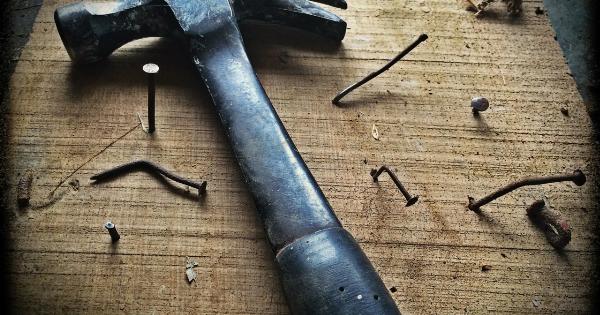Nail biting is a common habit that affects people of all ages. It’s not just an annoying habit; it has some hidden meanings that can reveal a lot about a person’s inner world.
In this article, we will explore the hidden meanings behind nail biting and what it says about a person’s emotional state.
What is Nail Biting?
Nail biting is the act of biting nails of the fingers and toes with the teeth. According to studies, nail biting is a common habit that affects between 20-30% of the population. It is usually done as a response to stress, anxiety, or boredom.
The Hidden Meanings of Nail Biting
Nail biting is a subconscious habit and can reveal a lot about a person’s emotional state. The following are the hidden meanings of nail biting:.
1. Anxiety and Stress
One of the most common reasons for nail biting is anxiety and stress. People who are under pressure often resort to nail biting as a way to cope with their emotions. It’s a physical outlet for their emotional stress, and it can be very calming for some.
2. Boredom
People who are bored often resort to nail biting as a way to pass the time. It’s a subconscious habit that can keep them occupied when they’re not doing anything. When someone is bored, nail biting provides an outlet for their pent-up energy.
3. Perfectionism
Some people who are perfectionists may find themselves biting their nails. They feel that their nails are not perfect, and they want to fix them. As a result, they bite their nails as a way to make them look better.
This can be a very frustrating habit for someone who wants to have perfect nails all the time.
4. Low Self-esteem
Some people who have low self-esteem may bite their nails. They feel that they are not good enough and that they are not worth taking care of. As a result, they neglect their nails and bite them.
This can be a difficult habit to break, especially if someone has low self-esteem for a long time.
5. Lack of Confidence
People who lack confidence may find themselves biting their nails. They feel uncomfortable in social situations and may resort to nail biting as a way to cope with their emotions.
Nail biting provides a physical outlet for their anxiety and makes them feel more in control.
6. Attention-seeking Behaviour
Some people may resort to nail biting as a way to get attention. They know that nail biting is not socially acceptable, and they may do it intentionally to attract people’s attention.
This can be a very destructive habit, as it can lead to negative attention and ridicule from others.
7. Trauma or Abuse
People who have experienced trauma or abuse may find themselves biting their nails. It’s a subconscious habit that provides an outlet for their emotions.
Nail biting can be a sign of PTSD (Post Traumatic Stress Disorder) and should be addressed by a professional.
8. OCD (Obsessive-Compulsive Disorder)
Some people who have OCD may find themselves biting their nails. They have an urge to bite their nails, and they can’t control it. OCD is a mental health disorder that requires professional help, and nail biting can be a sign of it.
9. Habits from Childhood
Nail biting can be a habit that someone has been doing since childhood. It’s a deeply ingrained habit that can be difficult to break.
If someone has been biting their nails for a long time, it’s essential to understand the hidden meanings behind it and address them to break the habit.
10. Sensory Stimulation
Some people may bite their nails as a way to provide sensory stimulation. They enjoy the feeling of biting their nails and the textures and sensations that it provides.
This can be a difficult habit to break, as it provides sensory feedback that they crave.
Breaking the Nail Biting Habit
Nail biting is a habit that can be challenging to break. However, with the right treatment and support, it is possible to overcome. The following are some of the ways to break the nail biting habit:.
1. Identify the Triggers
Identifying the triggers of nail biting is the first step towards overcoming it. Understand why you bite your nails and what emotions or situations trigger the habit. Once you identify the triggers, you can address them and find healthier ways to cope.
2. Find Healthier Ways to Cope
Finding healthier ways to cope with stress, anxiety, and other emotions is essential for breaking the nail biting habit. You can try deep breathing, meditation, exercise, or any other healthy activity that helps you relax and reduce your stress levels.
This will help you find a healthier outlet for your emotions and break the nail biting habit.
3. Get Professional Help
If you have tried to break the nail biting habit on your own and are struggling, it’s essential to seek professional help. A therapist can help you understand the underlying causes of your habit and provide you with the right treatment to overcome it.
4. Keep Your Nails Short
Keeping your nails short can help reduce the temptation to bite them. Short nails are less satisfying to bite, and it can help break the habit.
5. Use a Bitter Nail Polish
Using a bitter nail polish can help break the nail biting habit. The bitter taste will remind you not to bite your nails and make it less appealing to do so.
Conclusion
Nail biting is a habit that affects many people and can reveal a lot about a person’s emotional state. Understanding the hidden meanings behind nail biting is essential for breaking the habit and addressing the underlying causes of the behavior.
With the right treatment and support, it is possible to overcome nail biting and find healthier ways to cope with stress and anxiety.






























